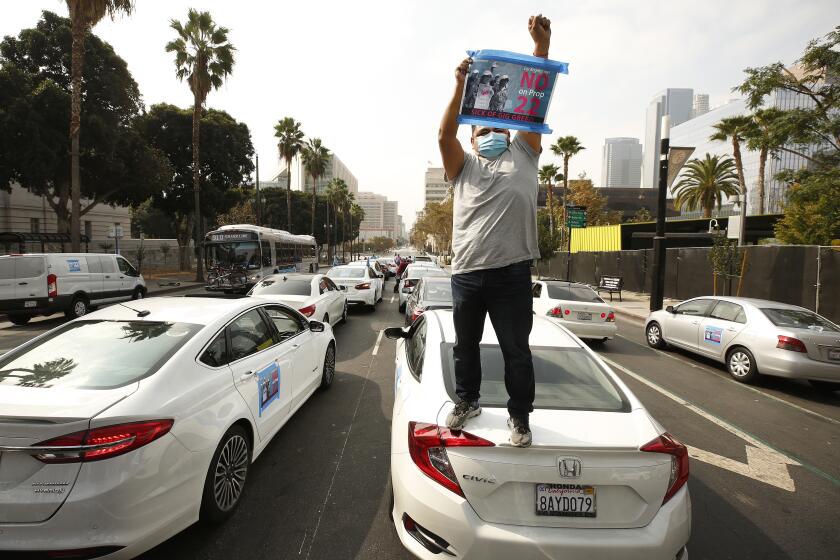Public employees cannot use labor law to sue employers, California Supreme Court rules

- Share via
Public agencies in California are not subject to a controversial law that gives workers the power to sue their employers over alleged labor violations, the state’s Supreme Court has ruled.
In the unanimous decision issued last week in a case involving a large healthcare system in the Bay Area, justices on California’s top court also found that public employers are largely exempt from wage law giving workers the right to daily meal and rest breaks.
Taken together, the two prongs of the ruling significantly curtail the ability of public employees in the state to seek help from the courts in labor disputes. Advocates for workers criticized the decision, while others said it would provide needed protections for agencies against costly lawsuits and penalties.
“Public employers are getting hit with lawsuits that can be very expensive to defend,” said Brian P. Walter, an attorney. The decision “is beneficial for the public.”
The case stemmed from a lawsuit filed in 2021 by a medical assistant and nurse working at Highland Hospital in Oakland against Alameda Health System, which operates several hospitals and clinics. The workers alleged their employer frequently denied or discouraged staff from taking breaks to eat and rest, deducted half an hour of pay from each work day even if a worker didn’t take a meal break, and failed to keep accurate payroll records.
After secret negotiations this month, the battle brewing over California workers’ unique right to sue their bosses has been settled.
The suit sought civil penalties for those violations under the Private Attorneys General Act, which grants workers the ability to sue employers on behalf of themselves and other employees over allegations of wage theft and other workplace abuses.
The case delved squarely into the unsettled intersection of labor law and government agencies. Some provisions of California labor code are ambiguous on whether they apply to the public sector, while others clearly include public employees. For example, a new statute enacted in 2023, explicitly requires meal and rest breaks for public employees involved directly in patient care in hospital, clinic and other public health settings.
The court’s ruling, authored by Justice Carol A. Corrigan, clarified that the labor code only applies to public agencies when they are expressly included. The “plain language of the governing wage order ... excludes public employers from most of the wage and hour obligations it places on private employers,” she wrote.
On the issue of the right of public employees to sue their employers, Corrigan said the Legislature did not intend government agencies to incur penalties under the Private Attorneys General Act. It would be strange for a public agency to have to pay out such penalties and attorney fees from taxpayer-funds, as “the result would simply rob Peter to pay Paul,” the ruling said.
PAGA allows workers to pursue civil penalties on the state’s behalf, with a quarter of any award going to the employees who brought the claim and the rest to the state’s Labor and Workforce Development Agency to help fund its enforcement of labor rules.
In light of the ruling, state lawmakers could pass new legislation or amend the law to include government workers, the court said. Lawmakers, however, may be reluctant to revisit the act’s wording following a recent compromise that lessened penalties under the law to address long-running concerns from businesses that it left them exposed to potentially devastating rulings.
A California law classifying Uber and other ride-hail and delivery drivers as employees rather than independent contractors is constitutional, federal court says.
Some lower courts have upheld PAGA lawsuits by public employees in the past, but the top court’s decision prevents such rulings in the future.
The decision adds to a long history of “cutting public employees out of certain rights,” said Ari Stiller, attorney for the California Employment Lawyers Assn. Treating public employers as sovereign entities “hurts public workers,” Stiller said.
Stiller said the ruling is at odds with previous statements by justices arguing that PAGA is one of the most important statutes workers have available to them to enforce their labor code rights. Although unions representing public sector workers may be able to negotiate rights for workers similar to those provided by state laws, Stiller said, “that’s not a strong justification for depriving all public workers of those rights in the first place.”
More to Read
Inside the business of entertainment
The Wide Shot brings you news, analysis and insights on everything from streaming wars to production — and what it all means for the future.
You may occasionally receive promotional content from the Los Angeles Times.













